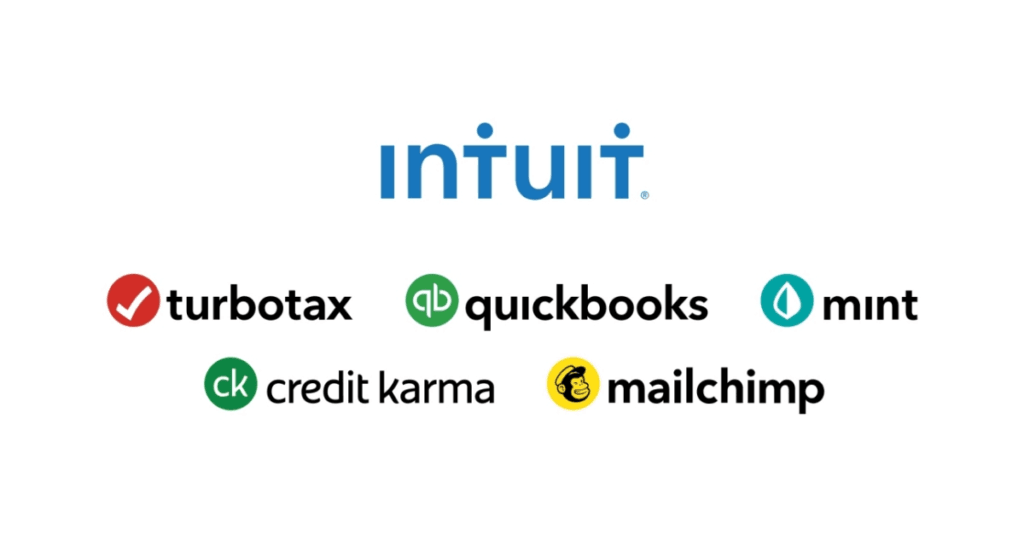
Intuit is the future of AI for Small Business Growth and Financial Innovation
Intuit Inc. is one of the most recognized names in the financial software industry. Known for products such as QuickBooks, TurboTax, Credit Karma, and Mailchimp, it has been at the forefront of empowering individuals, small businesses, and accountants with the tools to manage their finances more efficiently. Recently, the company has been making significant strides with artificial intelligence (AI), which is transforming the way it serves its diverse user base.
As AI continues to disrupt traditional business models and industries, Intuit’s adoption of AI in its products has the potential to redefine how small businesses manage their finances. Through automation, intelligent recommendations, and personalized financial guidance, it is setting itself up as a leader in AI-driven financial solutions.
In this article, we will delve into Intuit’s ongoing AI initiatives, examine its financial performance, and look at how its innovative tools are helping small businesses thrive. We will also explore the challenges and opportunities that lie ahead for the company as it positions itself for future growth.
Intuit’s AI Revolution: Transforming Small Business Finances

Intuit’s bold shift towards artificial intelligence is aimed at creating a more efficient and personalized financial experience for users. The company’s focus is not just on automating tasks but on embedding AI into the core of its products to enable smarter decision-making for small businesses and individuals.
One of the most significant recent moves by Intuit is the introduction of an AI-powered financial assistant for QuickBooks. This generative assistant helps small to medium-sized businesses (SMBs) automate mundane financial tasks such as generating invoices, estimates, bills, and payment reminders. By leveraging AI, the platform delivers personalized recommendations to users, optimizing their workflows and giving them more time to focus on growing their business.
The AI-powered assistant is built on Intuit’s expert platform, which aims to provide businesses with “done-for-you” experiences. In practical terms, this means that users no longer need to manually input data for invoicing, tax filing, or payments. The AI does it for them, learning from user interactions to improve over time. This level of automation is a game-changer for small businesses that are often under-resourced and need tools that are both powerful and simple to use.
Moreover, the company plans to integrate agentic AI across its product suite in the coming years. By December 2024, Intuit intends to introduce more AI-driven features that will continue to enhance its platforms and products like QuickBooks, TurboTax, and Credit Karma【7†source】.
Yahoo! Finance, openPR, stocktitan
The Rise of AI-Powered Financial Solutions for Small Businesses
AI has become a key tool in simplifying financial management for small businesses. Many small business owners lack the resources to employ large teams of accountants, making it essential to rely on software tools that are both intuitive and efficient. Traditional methods such as spreadsheets or manual data entry are increasingly being replaced by AI-driven systems that reduce errors, save time, and offer actionable insights.
For Intuit, this move toward AI is part of a broader effort to provide seamless solutions for the SMB sector. According to Intuit’s recent earnings reports, the company saw substantial growth in its Global Business Solutions segment, which includes QuickBooks and other tools tailored for small businesses【8†source】.
In fact, QuickBooks Online Accounting saw a 21% increase in revenue in the first quarter of fiscal 2025. This growth was fueled by customer expansion, better pricing strategies, and the introduction of AI-powered solutions that meet the increasingly complex needs of SMBs【7†source】. This success is a testament to the growing demand for tools that can simplify and automate financial operations.
Furthermore, a recent survey by PYMNTS found that 96% of SMBs who have adopted AI believe that the technology has been effective in improving their business operations【7†source】. The widespread acceptance of AI in small businesses marks a major shift in the industry, one that it is capitalizing on with its ongoing innovations.
Intuit’s Impressive Financial Performance in Q1 2025

Intuit has had a strong start to its fiscal year 2025, with solid revenue growth driven by its AI innovations. In its first-quarter earnings report, Intuit announced a 10% increase in overall revenue, totaling $3.3 billion. This growth was particularly driven by the company’s Global Business Solutions Group and Credit Karma, both of which saw significant year-over-year gains【7†source】.
Key financial highlights from Q1 include:
- QuickBooks Online Accounting: 21% revenue growth.
- Credit Karma: 29% revenue growth, fueled by the expansion in personal loans, auto insurance, and credit cards.
- Global Business Solutions: Revenue increased to $2.5 billion, a 9% year-over-year growth.
Despite some minor declines in other segments, such as the Consumer Group, Intuit’s leadership remains confident in its strategy. The company reported strong financial performance and reiterated its full-year guidance for fiscal 2025, predicting 12-13% revenue growth. This outlook reflects a healthy balance between innovation-driven growth and the challenges posed by external economic factors【8†source】【7†source】.
Challenges on the Horizon for Intuit
While Intuit’s financial results for Q1 2025 were strong, the company does face some challenges. One of the key issues revolves around increasing competition in the financial software market. Companies like H&R Block and Square are also investing heavily in AI-driven financial tools for small businesses, which means this must continue innovating to maintain its competitive edge.
Another challenge lies in the regulatory environment. Intuit is already under scrutiny in some regions due to its acquisition strategies and its dominant market share in personal finance and tax preparation software. Additionally, the potential rise of free tax-filing apps—as suggested by recent proposals in the U.S. government—could impact Intuit’s core products like TurboTax【7†source】.
Despite these challenges, Intuit’s management remains confident in its ability to navigate the evolving landscape. The company’s deep integration of AI into its platforms, combined with its broad user base across small businesses and individual consumers, provides a solid foundation for continued growth.
AI and the Future of Intuit’s Product Ecosystem

Looking to the future, Intuit is doubling down on its commitment to AI, aiming to integrate agentic AI across all of its platforms by 2025. This includes developing intelligent tools that go beyond basic automation. For example, the upcoming AI-powered features will allow users to receive personalized financial advice and real-time insights into their business performance.
Intuit’s ability to offer more personalized, data-driven solutions will be crucial as small businesses face an increasingly complex economic environment. With rising costs, economic uncertainty, and a need for better financial visibility, small business owners are turning to software that can adapt to their unique needs. AI-powered systems like those being developed by Intuit offer the potential to revolutionize financial management, delivering insights and recommendations that were once only available to larger enterprises.
Moreover, AI-driven automation could help small businesses save time and money by reducing the need for manual intervention. For instance, the QuickBooks AI assistant could help business owners track cash flow, predict future expenses, and suggest ways to optimize financial operations. These features could level the playing field, making it easier for small businesses to compete with larger organizations that have more resources to dedicate to financial planning.
Yahoo! Finance, openPR, stocktitan
The Role of Credit Karma and Mailchimp in Intuit’s Strategy

Alongside QuickBooks and TurboTax, Intuit’s Credit Karma and Mailchimp products play a crucial role in the company’s long-term strategy. Credit Karma, which provides free credit scores and financial tools, has seen significant growth, particularly in personal loans, auto insurance, and credit cards. In Q1 2025, Credit Karma reported a 29% revenue growth, contributing substantially to Intuit’s overall performance【7†source】.
Mailchimp, the popular email marketing tool, is another integral part of Intuit’s ecosystem. The platform serves millions of small businesses and provides them with essential marketing tools, including email campaigns, automation, and customer relationship management (CRM). As this continues to integrate AI across all its platforms, we can expect Mailchimp’s marketing automation to become even more personalized, allowing small businesses to tailor their outreach efforts to individual customer preferences.
Intuit’s AI-Driven Future
In conclusion, Intuit is positioning itself for a bright AI-powered future. By leveraging artificial intelligence, the company is transforming financial management for small businesses and individual consumers alike. With products like QuickBooks, TurboTax, Credit Karma, and Mailchimp, Intuit is addressing the growing complexity in the financial world and helping businesses manage their finances more efficiently.
Despite facing some competition and external challenges, Intuit’s AI strategy is driving strong growth, and the company is well-positioned to maintain its leadership in the financial software space. As more small businesses embrace AI and seek digital solutions, Intuit’s commitment to AI-powered innovation will likely continue to yield impressive results, cementing its place as one of the most important players in the financial technology market.
Yahoo! Finance, openPR, stocktitan
FAQs
- How is Intuit using AI to help small businesses? Intuit uses AI to automate tasks such as invoicing, tax filing, and payment reminders, offering personalized financial advice to small businesses.
- What are the key products driving Intuit’s growth? QuickBooks Online, Credit Karma, and Mailchimp are key contributors to Intuit’s revenue growth.
- How did Intuit perform financially in Q1 2025? Intuit reported a 10% revenue growth, with QuickBooks Online and Credit Karma showing significant year-over-year increases.
- What challenges does Intuit face? Intuit faces competition from other fintech companies, as well as regulatory challenges related to market dominance and free tax-filing apps.
- What is Intuit’s AI strategy for 2025? Intuit plans to integrate agentic AI across its platforms, offering more personalized and intelligent tools for small businesses and individual users.
- How will Intuit’s AI-powered tools benefit small businesses? AI-powered tools will automate financial tasks, provide insights, and offer recommendations that help small businesses save time and make better financial decisions.
Do follow for more news: DailyForesight



